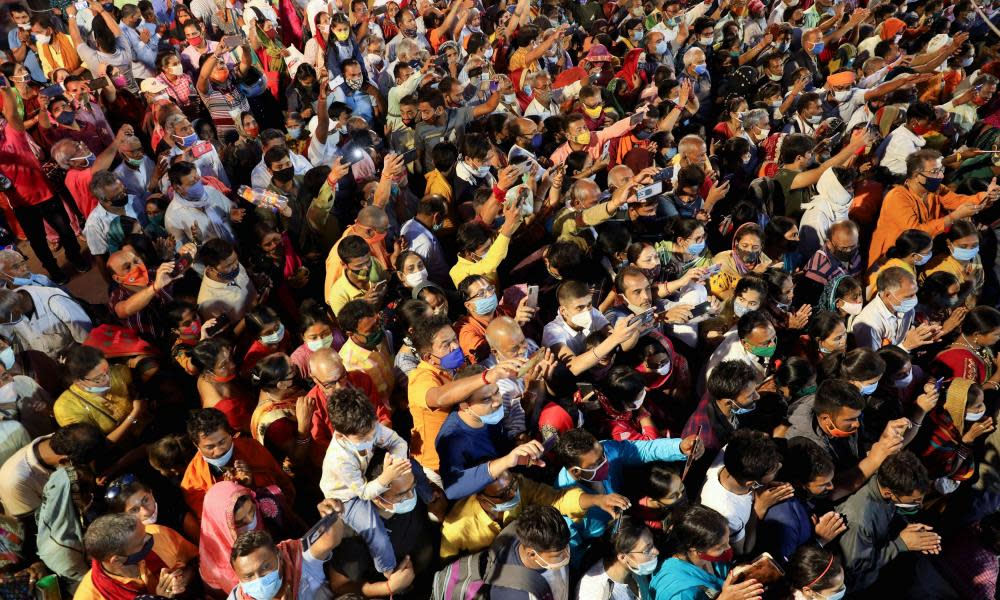Why is India seeing such a huge surge in Covid-19 cases?

India has seen a terrifying increase in coronavirus cases in the past few weeks. Tuesday saw another new record when the country racked up 295,041 new cases, up from around 273,000 from the previous day, with no sign that the surge is abating.
The capital, New Delhi, was placed in lockdown for a week from Monday, and Maharashtra state, the centre of the surge and home to the financial capital, Mumbai, further tightened restrictions on shops and home deliveries from Tuesday.
The US Centers for Disease Control on Monday advised against all travel to India, and the UK imposed restrictions on arrivals from the country.
India has recorded more than 15m cases of Covid-19, second only to the US, and has the fourth highest death toll at more than 180,000.
What has caused the resurgence, which Narendra Modi, India’s prime minister, described on Tuesday as “like being hit by a storm”?
Watch: Oxygen looted in India as supplies run low
Lack of preparedness
At the beginning of February, India appeared to have the virus under control. Daily cases were barely more than 10,000 a day – considered low for a country of 1.3 billion people.
But since then the number has spiked twentyfold, catching the government off guard and underprepared. The health minister, Harsh Vardhan, said in March that the country had entered the “endgame” of the virus but cases were already beginning to take off by that point. Bhramar Mukherjee, a biostatistician at the University of Michigan who has been tracking India’s pandemic, told the Associated Press that India had failed to learn from second or third surges in countries including Brazil and the UK, to ensure it was ready for a similar situation.
‘Double mutant’ variant
The discovery of a new variant of Covid-19 in India has caused widespread concern and has been blamed as one of the main factors driving the wave of cases. The variant is known as B.1.617 and has caused alarm because it has two spike proteins rather than one. This so-called “double mutant” variant is believed to be more transmissible than previous strains. Although scientists are still not certain exactly how dangerous it is, the rapid spread of the variant through Maharashtra and then the rest of the country is key reason why the UK has banned travel from India.
Health system overwhelmed
There are multiple reports of people being unable to find hospital beds, with desperate relatives pleading on social media for help to find care. There is also a severe shortage of medical supplies, especially oxygen. A hospital at Burari on the outskirts of Delhi reported on Monday that it had only two days’ worth of oxygen left and that suppliers had run out.
Related: ‘A tsunami of cases’: desperation as Covid second wave batters India
Just as was the wider health system, laboratories were unprepared for the steep rise in demand for testing that came with the surge. Everyone was “caught with their pants down”, according to A Velumani, the chairman and managing director of Thyrocare, one of India’s largest private testing labs. He told the Associated Press that the demand was now three times that of last year.
Lockdowns eased too quickly
India was praised for its swift lockdowns last year but there has been criticism of the government for allowing restrictions to ease too quickly. Modi, who has resisted suggestions that nationwide measures should be reintroduced has attracted fire for holding rallies without proper social distancing. Hindu festivals have also been allowed to go ahead, most notably the massive Kumbh Mela gathering in Haridwar which has attracted as many as 25 million people since January, including about 4.6 million last week alone, with most people ignoring Covid-19 guidelines.
Vaccine rollout
India launched a massive vaccination program but it has not been enough to stem the tide. More than 100m doses have been delivered but the country has been hampered by lack of supply. The government said last week it had fewer than 27m doses left, enough to last about nine days. India is the world’s biggest producer of vaccines and is now expected to divert some production to domestic use, causing alarm over shortages elsewhere in the world.
Associated Press contributed to this story
Watch: What UK government COVID-19 support is available?

 Yahoo News
Yahoo News 